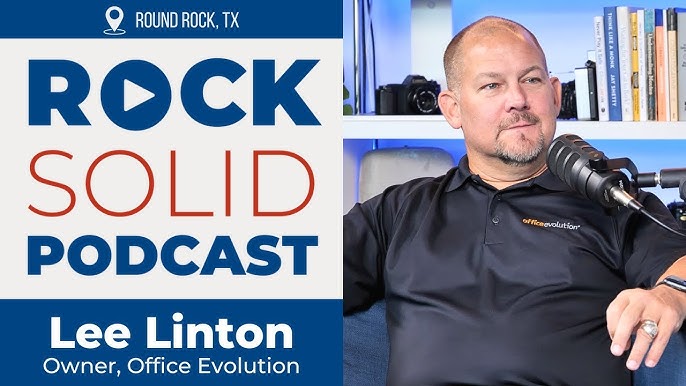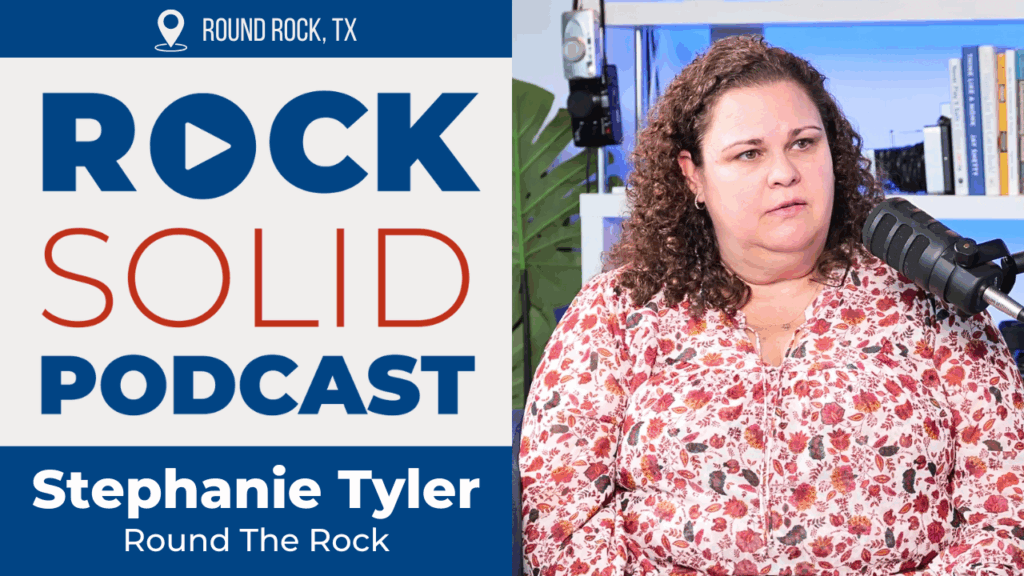On this episode of Rock Solid, we sit down with Dr. Mark Malone of Advanced Pain Care, one of the largest pain clinics in the nation, founded right here in Round Rock, TX. Dr. Malone shares his incredible journey from treating patients to becoming one himself after a life-changing back injury. He opens up about the innovations in pain treatment, including spinal stimulation, and why a multidisciplinary approach is the future of chronic pain care. If you or someone you know lives with pain, this is the episode to hear.
Listen now and discover why healing is personal, and Round Rock is the place making it possible.
Transcript
Guest: Dr. Mark Malone, Advanced Pain Care
Host: Bryan Eisenberg
Topic: Chronic Pain, Innovation, and Community
Bryan Eisenberg:
Welcome to Rock Solid, the Round Rock Business Leaders Podcast. I’m your host, Bryan Eisenberg. Today, I’m joined by Dr. Mark Malone from Advanced Pain Care. First off, congratulations—this month marks your 23rd anniversary.
Dr. Mark Malone:
Thanks, Bryan. We’re proud to be here. It’s been quite a journey.
Bryan:
Advanced Pain Care has grown tremendously. Round Rock is your flagship, right?
Dr. Malone:
That’s right. We started here and now have around 20 locations across Texas, including about nine in the Austin area.
Bryan:
People often imagine a pain clinic as a small office, but yours is something else entirely. Can you describe what makes it different?
Dr. Malone:
Sure. I’m proud to say we’re the second-largest pain clinic in the country—maybe the world. We have 25 doctors. It’s a multidisciplinary clinic because pain is complex. We bring together pain management, neurosurgery, rheumatology, orthopedics, pharmacology, psychology, and physical therapy all under one roof. We also do surgeries.
Bryan:
That’s a comprehensive setup. Chronic pain affects over 100 million Americans. Why is it such a tough issue for general doctors to treat?
Dr. Malone:
There are a few reasons. One, primary care doctors often don’t have the tools or time. Two, prescribing opioids now involves strict oversight due to the opioid crisis. Many primary care physicians aren’t comfortable or equipped to manage chronic pain effectively.
Bryan:
I recently read in The New York Times that many doctors avoid chronic pain patients altogether. It’s hard to measure and, frankly, patients in pain can be high maintenance.
Dr. Malone:
Exactly. These patients are often physically, mentally, and financially drained. They’re at the end of their rope. It takes a lot of compassion and patience to help.
Bryan:
What makes your approach different is that you understand the patient perspective firsthand. You actually became a chronic pain patient yourself.
Dr. Malone:
Yes. I started the clinic first, but in 2008 I hurt my back lifting something. I felt a pop, fell to the ground, and just like that, I was in chronic pain. For a year, I could barely get out of bed. I lost 40 pounds and had to work from bed using just a laptop and phone. The clinic nearly closed, but our team held it together.
Bryan:
What helped you finally recover?
Dr. Malone:
In 2017, spinal stimulators changed everything. It’s like a pacemaker for your spine. It blocks pain signals. I had one implanted and it was night and day. For me, it was a miracle.
Bryan:
It’s fascinating that some people with the same injury feel no pain, while others do. Why is that?
Dr. Malone:
The difference is nerve damage, which is invisible and unpredictable. About 50 percent of people with a spinal injury develop chronic nerve pain. We can’t test for it directly. There’s no diagnostic port on the human body.
Bryan:
How do you handle both the physical and psychological sides of pain?
Dr. Malone:
We address both. Chronic pain often causes depression, anxiety, and weight issues. Our behavioral health department includes social workers trained in counseling. We also have physical therapy. We treat the whole person.
Bryan:
What’s the age range of your patients?
Dr. Malone:
Mostly adults over 50. That’s when spinal degeneration typically starts. It’s like gray hair—if you live long enough, it shows up. The discs start to flatten, the bones compress the nerves, and the pain begins.
Bryan:
If someone calls your clinic today, what happens next?
Dr. Malone:
We aim for same-day or next-day appointments. You’ll see a double board-certified pain specialist. We do a full exam, possibly X-rays or MRIs, and develop a custom treatment plan. That could include medication, spinal injections, or physical therapy.
Bryan:
You’ve lived in Central Texas for a long time. What brought you here?
Dr. Malone:
I grew up in Waco and went to UT Austin. I left for training in Dallas and Houston but came back in ’91. I worked as a hospital anesthesiologist before starting in pain management around 1998.
Bryan:
Why Round Rock?
Dr. Malone:
Round Rock was underserved and had great infrastructure. The city is responsive, and it’s a great place to do business. We opened here in 2007 and built a full surgery center and comprehensive clinic.
Bryan:
You’re also very active in the community. Why is that important?
Dr. Malone:
We believe in giving back. We support veterans, Little League, churches, and local events. It’s not just about medicine—it’s about connection.
Bryan:
You’re an anesthesiologist by training. Should more doctors be trained in pain care?
Dr. Malone:
Absolutely. There’s a major shortage of pain doctors. We need more medical schools and more training opportunities. Dell Medical School in Austin is a great start, but we need a hundred more.
Bryan:
Where do you see pain treatment going in the next 20 years?
Dr. Malone:
Right now, pain research is about 20 years behind other fields. But if we keep investing, the potential is huge. Maybe even a drug that treats nerve damage directly, which would be a game changer.
Bryan:
You accept all kinds of insurance, including Medicaid and VA, right?
Dr. Malone:
Yes, we work with all types of insurance. One of our goals is accessibility. The biggest obstacle is simply awareness. Many people—and doctors—still don’t realize that comprehensive pain care exists.
Bryan:
How can people tell the difference between a clinic like yours and the many others out there?
Dr. Malone:
Look for a multidisciplinary approach. A real center should have board-certified specialists in pain management, anesthesiology, and neurosurgery. That’s essential for treating severe, life-altering chronic pain—the kind where people can’t get out of bed or function.
Bryan:
Let’s end on a fun note. Any local spots you love?
Dr. Malone:
Definitely. Round Rock Donuts, Old Settlers Park, and we love Flicks Brewery across the street from our clinic. And our team’s favorite hidden gem? Guadalajara Mexican Restaurant—great lunch spot.
Bryan:
And where can people learn more?
Dr. Malone:
Just search “Advanced Pain Care.” Our site is awesomed.com, but even typing our name into Google will get you there.
Bryan:
Thanks so much for your time today.
Dr. Malone:
Thank you, Bryan. It’s been a pleasure.


